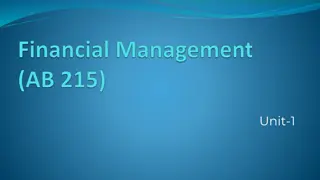Key Functions of a Financial Manager
Financial managers play a crucial role in the financial activities of a firm by managing tasks such as raising funds, allocating resources effectively, profit planning, and understanding capital markets. They must balance debt and equity, optimize fund allocation, maximize profits, and have a strong grasp of capital markets for making informed decisions.
Download Presentation

Please find below an Image/Link to download the presentation.
The content on the website is provided AS IS for your information and personal use only. It may not be sold, licensed, or shared on other websites without obtaining consent from the author. Download presentation by click this link. If you encounter any issues during the download, it is possible that the publisher has removed the file from their server.
E N D
Presentation Transcript
ROLE OF A FINANCIAL MANAGER
ROLE OF A FINANCIAL MANAGER Financial activities of a firm is one of the most important and complex activities of a firm. Therefore in order to take care of these activities a financial manager performs all the requisite financial activities. A financial manger is a person who takes care of all the important financial functions of an organization. The person in charge should maintain a far sightedness in order to ensure that the funds are utilized in the most efficient manner. His/Her actions directly affect the Profitability, growth and goodwill of the firm.
FOLLOWING ARE THE MAIN FUNCTIONS OF A FINANCIAL MANAGER:
RAISING OF FUNDS In order to meet the obligation of the business it is important to have enough cash and liquidity. A firm can raise funds by the way of equity and debt. It is the responsibility of a financial manager to decide the ratio between debt and equity. It is important to maintain a good balance between equity and debt.
ALLOCATION OF FUNDS Once the funds are raised through different channels the next important function is to allocate the funds. The funds should be allocated in such a manner that they are optimally used. In order to allocate funds in the best possible manner the following point must be considered. The size of the firm and its growth capability status of assets whether they are long-term or short-term mode by which the funds are raised. These financial decisions directly and indirectly influence other managerial activities. Hence formation of a good asset mix and proper allocation of funds is one of the most important activity
PROFIT PLANNING Profit earning is one of the prime functions of any business organization. Profit earning is important for survival and sustenance of any organization. Profit planning refers to proper usage of the profit generated by the firm. Profit arises due to many factors such as pricing, industry competition, state of the economy, mechanism of demand and supply, cost and output. A healthy mix of variable and fixed factors of production can lead to an increase in the profitability of the firm. Fixed costs are incurred by the use of fixed factors of production such as land and machinery. In order to maintain a tandem it is important to continuously value the depreciation cost of fixed cost of production. An opportunity cost must be calculated in order to replace those factors of production which has gone thrown wear and tear. If this is not noted then these fixed cost can cause huge fluctuations in profit.
UNDERSTANDING CAPITAL MARKETS Shares of a company are traded on stock exchange and there is a continuous sale and purchase of securities. Hence a clear understanding of capital market is an important function of a financial manager. When securities are traded on stock market there involves a huge amount of risk involved. Therefore a financial manger understands and calculates the risk involved in this trading of shares and debentures. Its on the discretion of a financial manager as to how to distribute the profits. Many investors do not like the firm to distribute the profits amongst share holders as dividend instead invest in the business itself to enhance growth. The practices of a financial manager directly impact the operation in capital market.























